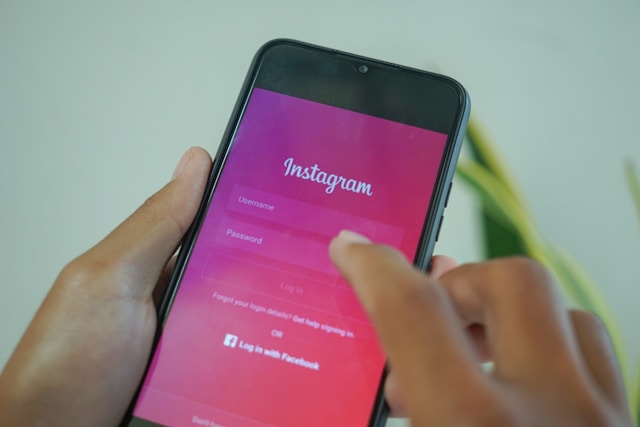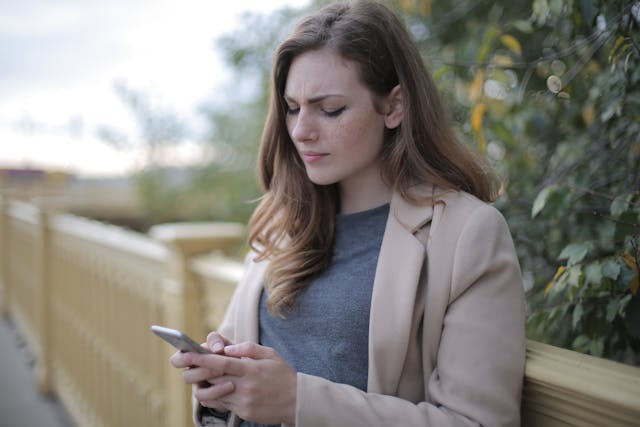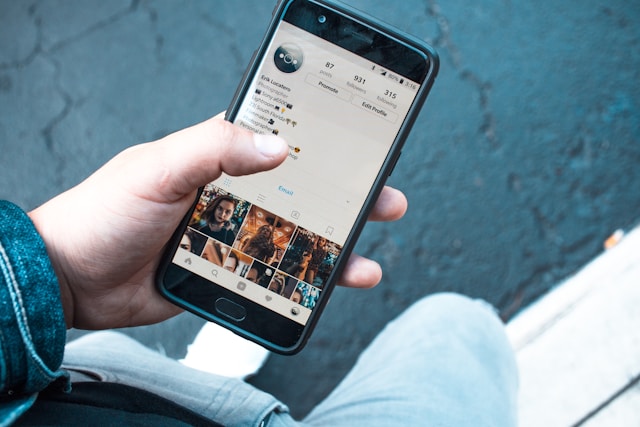How Does Social Media Affect Mental Health in Young Users?
Most people in this day and age probably agree that social media has become an integral part of everyday life. Not only does it connect us with friends, family, and people around the world, but it’s also heaps of fun. That said, being active on social media platforms isn’t all rainbows and butterflies. If you’re glued to your screen for an unhealthy amount of time, it could have negative effects on your mental health. But how does social media affect mental health anyway?
While social media has its pros and benefits, it has an ugly side, too. Some people—younger users especially—can have a dangerous relationship with social media. Instead of using it to connect with others and have fun, the internet might turn on them and cause anxiety. Things can turn for the worse and affect these young, sensitive users’ mental health in the long run.
That said, the answer to whether social media is good or bad is quite nuanced. It certainly has its highs and lows. Today, we’ll take a closer look at how social media can affect one’s mental health. Keep scrolling to learn more about this prevalent issue.

Social Media and Mental Health Statistics That Might Sound the Alarms
Social media and mental well-being have always been intertwined in a complex, nuanced way. And trust us; we can go on and on about the potential negative effects of social media on mental wellness. But all those will be arbitrary and downright useless without the numbers. So, allow us to give you the 411 on this with some recent, surprising social media and mental health statistics.
- According to the University of Maine, almost 60% of the world’s population is on social media. That’s 4.8 billion people online. And if that’s not enough, the number increases every year. From 2022 to 2023, the total number of social media users grew by 3.2%!
- As the number of social media users rises, the number of teens with smartphones does, too. The Child Mind Institute reports that around 92% of teens and young people own a smartphone.
- Interestingly, along with the rise in phone ownership, there seems to be a rise in depression as well. According to the American Psychiatric Association (APA), depressive symptoms in young adults increased by 63% from 2009 to 2017.
- Statista reports that 35% of adults feel that social media is responsible for the deterioration of the youth’s emotional well-being. Meanwhile, only 2% believe that it has nothing to do with this decline in mental wellness.
- Another Statista survey asked teens and young adults what social media platforms they believe impact their mental health. YouTube came out as the platform with the most positive effect on them. Sadly, it was Instagram that they said had the most negative impact on their mental wellness.

How Does Social Media Affect Teenagers’ Mental Health?
Social media can impact anyone’s life and emotional well-being. But it’s our youth that is extremely vulnerable to the internet’s negative effects. Why and how does social media affect teenagers’ mental health?
While teens are no longer children, their brains and bodies are still in the development stage. They’re navigating and learning more about their identity and emotional needs. That means they’re incredibly sensitive and need always to keep their mental well-being in check.
During this time of their lives, social media has significantly influenced them. Seeing how others present themselves online can lead them to feel more self-conscious. They might see the unattainable lives of peers or lifestyle influencers and feel the pressure to conform to what’s “in.” Are they presenting themselves the “right” way? The “cool” way? The way the world expects them to be?
All these thoughts—driven by social media—can lead to feelings of anxiety, isolation, and depression. Teens and young adults are still naïve and highly impressionable. They might take everything they see on the internet to heart. And while there are many times that this can be good, it can also have negative effects.

Pros and Cons of Social Media on Mental Health
Don’t get us wrong—there is plenty to love about social media. But while there are lots of advantages to being active online, there are bad things about it, too. What’s important is that young people know how to weigh the risks and build healthy social media habits. That way, they can reap all the benefits social media has to offer while still protecting themselves from harm.
But what are these good and bad things about the digital world young users have to look out for? Here are just some of the pros and cons of social media on mental health.
Pro: It Allows for Creative Self-Expression
Apps like Instagram and YouTube are awesome platforms for expressing yourself creatively. Think of them as outlets for letting your creative juices and thoughts flow.
Through photos and videos, young people can showcase and hone their talents while sharing them with the world. This allows them to discover more about themselves and their interests. These include photography, art, fashion, cooking and more. And that’s super important when you’re navigating your identity as a teenager!

Pro: It Helps Them Connect With Their Peers
Social media is meant for building meaningful social connections. On these platforms, young people can connect with their friends and family. You can message friends, catch up with your peers, and even discover accounts you want to follow. It also reduces feelings of FOMO (or the fear of missing out), which can be good for your mental wellness.
What’s awesome about social media as a means to connect with others is that it breaks geographical barriers. You can talk to friends who might live in different cities or even countries. That way, you can build and maintain friendships even with people who are far away. As a plus, it deepens your worldview and allows you to learn about different cultures, too!
All in all, social media helps strengthen relationships. It’s an amazing way to support others in your community and get that sense of belonging and support back.
Pro: You Get Access to Educational Information and News
Social media can also be a terrific source of news and educational information when you’re young. Gone are the days of reading the paper or waiting for the 6:00 PM news on TV. Today, young people can learn about current events and gather information from trusted social media channels.
Being in the know about these things can improve not just their emotional wellness but also their global awareness. By staying informed, young people can feel connected to different communities and learn about diverse world perspectives.
Con: It Can Lead You To Compare Yourself to Others
Instagram and many other social media platforms are full of carefully curated identities. People will post photos of themselves in the best angles and on their most luxurious trips and meals out. Travel influencers might show off their stay at fancy hotels in Europe. Instagram models and fashion influencers might post sultry, stylish, chic content.
So, when young people see these photos, they might start comparing their lives with everyone else’s. They may start to think themselves less attractive or successful if they don’t have similar experiences as others online. This can have dramatic negative effects on their emotional health and self-esteem.
But it’s important to remember that people’s best moments go on the feed, not their real, everyday life. Nobody’s life is perfect, even if it seems that way on social media. Younger generations should know never to compare themselves to these “perfect” people online. Social media is always just smoke and mirrors—an illusion that is hardly ever a picture of reality.
Con: You May Crave an Unhealthy Validation From Likes
Another danger of social media on one’s mental well-being is that it can lead to a dependence on external validation. People with a social media addiction might find themselves reeling if they don’t get enough likes on their posts.
That unhealthy craving for external validation can lead to high levels of stress and anxiety, especially in younger users. Not only is a low-like count a blow to the ego, but they’ll also feel self-conscious about what others think of them having so few likes. It can make them feel bored, annoying, and unattractive, which is terrible for a young person’s mental health.
Luckily, many social media platforms are trying to get rid of this mindset. Instagram, for example, has begun hiding the total number of likes of people’s posts. Only the original poster can see how many people have liked their content. That way, users are less likely to compare their number of likes to that of others.

Con: It Exposes Young People To Cyberbullying
Many people can show their true colors on the internet thanks to social media’s veil of anonymity. It’s super easy to make burner accounts on social media and harass other people or write hurtful comments.
Anyone with a social media account, therefore, exposes themselves to cyberbullying online. People can be ruthless on the internet, calling people names and being discriminatory online. Comments like these can have a huge effect on young people’s self-esteem. This can lead to depressive symptoms and anxiety.
Con: Social Media Addiction Can Negatively Impact Real-Life Relationships
Plenty of young people don’t realize that they’re suffering from social media addiction. According to Jefferson Health, being on social media can give people a surge in dopamine, aka the “feel-good” hormone. This temporary kick in happiness keeps them coming back for more. Some might compare it to trying to win on a slot machine. You know your chances of winning are low, but that adrenaline makes you do it again and again anyway.
But an unhealthy obsession with social media is bad for your real-life social connections. Instead of maintaining good relationships with friends at school or their family, they’re glued to their phones, consuming content.
This can make it more difficult for young people to have offline social interactions, which can hurt their relationships. In the long run, this can lead to isolation and depressive symptoms.
How Does Social Media Affect Mental Health in the Long Run?
Some people may think that depression and anxiety from social media are just phases. Maybe these kids will outgrow their desire for more likes on their posts, right? Well, social media users can indeed mature in that regard. However, these negative effects of social media can still affect them long into adulthood. How, you ask? Here are just some of the ways.
- Trauma from cyberbullying and harassment. Receiving mean, discriminatory comments from your younger days on social media can cause low self-esteem and depressive symptoms. For many, these feelings of self-consciousness never go away. These bad emotions might stay with people long into their adult lives, impacting how they see themselves.
- Negative impact on offline relationships. When a young person becomes addicted to social media, it hurts their real-life social connections. Instead of building a good relationship with family, they’re glued to their phones 24/7. Sometimes, this can lead to irreparable, broken relationships.
- The need for external validation. An obsession with external validation from people on the internet could seep into your offline life. Maybe years down the line, you become a sort of “people-pleaser.” Instead of putting your wants and desires first, you’ll be more concerned about what strangers want to see from you. This way of thinking can affect major life decisions later on.
Should We Encourage the Use of Social Media Apps for Teens?
Let’s face it. Although social media might have its cons, popular apps like Instagram, TikTok, and more are here to stay. But should we be encouraging the use of these social media apps for teens?
There’s no one-size-fits-all answer for this. Parents might want to protect their teens as much as possible from the detrimental effects of social media. This is especially the case for young people who are already dealing with mental health issues. For some teens, social media could be good for their mental wellness. For others, not so much.
What’s important is for parents to know how to make their teens’ online experience safe and enjoyable. Here are some of the ways to do just that.
- Encourage healthy social media habits, like limited screen time. This is something parents can do using Instagram parental controls.
- Set rules like “no phone at the dinner table” to encourage a healthy offline life. That way, they can have the best of both worlds—an active social media presence and good relationships with family.
- Build young people’s confidence and teach them early on that they don’t need to conform to the internet’s beauty standards.
- Teach young people about online safety so that they don’t fall victim to scams and predators.
On IG, Focus on Genuine Growth Instead of Likes to Improve Mental Health
There are plenty of advantages to being active on social media platforms. You get the freedom to express yourself creatively and make meaningful social connections with others.
However, it’s also important to be fully aware of its cons. An unhealthy, addictive relationship with the internet can lead to overwhelming anxiety and depressive symptoms. It’s important to foster a good relationship with social media, especially when you’re young. That way, you can fully enjoy the online experience while maintaining excellent mental health.
As mentioned earlier, social media can be detrimental to one’s emotional well-being by having an unhealthy desire for external validation. So many young creators focus on their Instagram likes and engagement when posting content online. It’s better for these young users to focus on their Instagram growth instead of that arbitrary count.
The more real, genuine followers you have, the more meaningful engagement you’ll see in your content. You’ll realize the bigger purpose of social media—creating entertaining, valuable content for your audience. In the long run, this can improve your emotional and social well-being instead of destroying it.
Now that you know the answer to “How does social media affect mental health?” it’s time to spring into action. Focus on your growth and purpose online instead of external validation and conforming to unnecessary social standards. Path Social can help with that.
Our AI-powered targeting algorithm can help pin down your niche audience. Then, we’ll push your content to show up on their feed. That way, you can be sure your posts are reaching the people they will resonate with most. As a result, you’ll see continuous growth in your follower count and, consequently, genuine engagement in your content. Grow your page with us today!
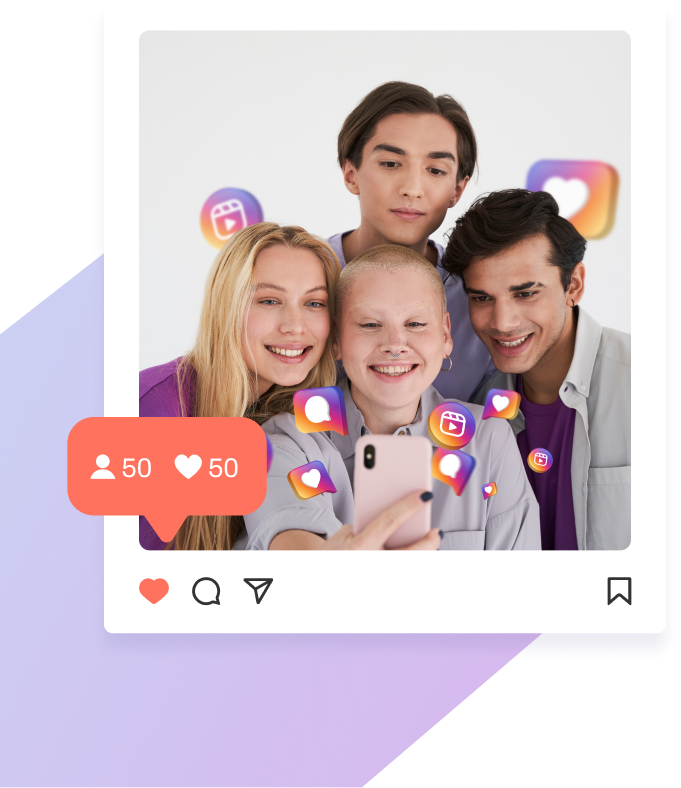
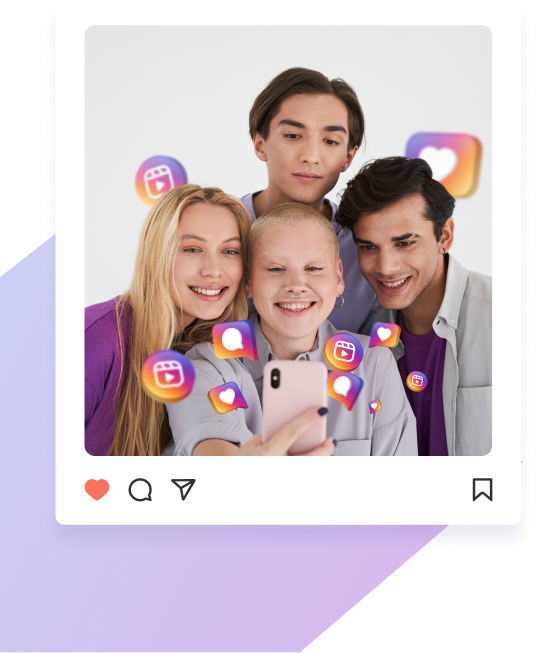
Want Free Instagram
Followers?
Let our AI targeted organic growth work for you for free
Get Free Instagram Followers





